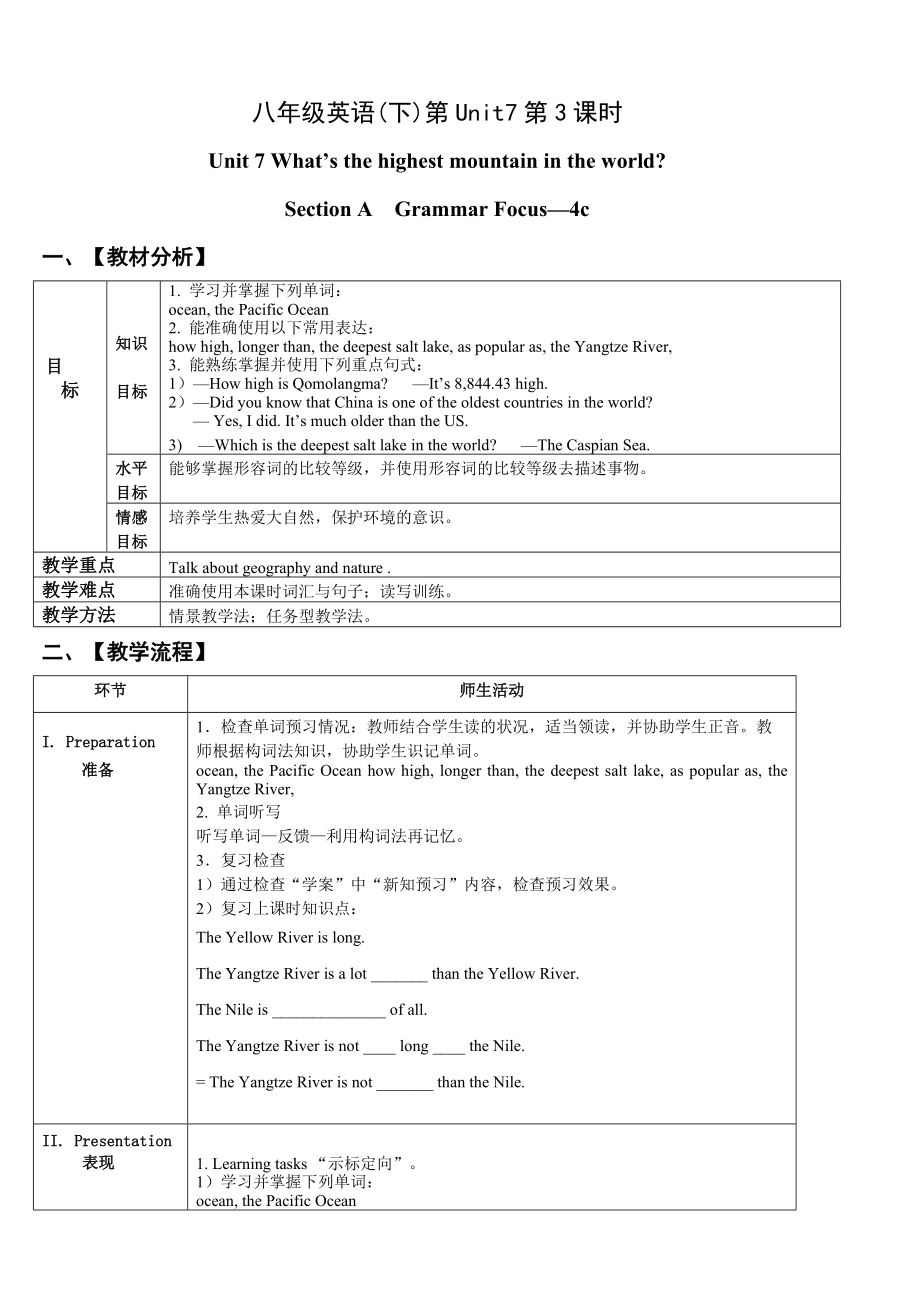《新目標(biāo)八年級(jí)英語(yǔ)下冊(cè)Unit 7第3課時(shí)》由會(huì)員分享��,可在線閱讀��,更多相關(guān)《新目標(biāo)八年級(jí)英語(yǔ)下冊(cè)Unit 7第3課時(shí)(3頁(yè)珍藏版)》請(qǐng)?jiān)谘b配圖網(wǎng)上搜索��。
1��、
八年級(jí)英語(yǔ)(下)第Unit7第3課時(shí)
Unit 7 What’s the highest mountain in the world?
Section A Grammar Focus—4c
一、【教材分析】
目[來(lái)源:21世紀(jì)教育網(wǎng)]
標(biāo)
知識(shí)21世紀(jì)教育網(wǎng)
目標(biāo)
1. 學(xué)習(xí)并掌握下列單詞:[來(lái)源:21世紀(jì)教育網(wǎng)]
ocean, the Pacific Ocean[來(lái)源:21世紀(jì)教育網(wǎng)]
2. 能準(zhǔn)確使用以下常用表達(dá):
how high, longer than, the deepest salt lake, as popular as, th
2��、e Yangtze River,
3. 能熟練掌握并使用下列重點(diǎn)句式:
1)—How high is Qomolangma? —It’s 8,844.43 high.
2)—Did you know that China is one of the oldest countries in the world?
— Yes, I did. It’s much older than the US.[來(lái)源:21世紀(jì)教育網(wǎng)]
3) —Which is the deepest salt lake in the world? —The Caspian Sea.
水平
目標(biāo)
3��、能夠掌握形容詞的比較等級(jí)��,并使用形容詞的比較等級(jí)去描述事物��。
情感
目標(biāo)
培養(yǎng)學(xué)生熱愛(ài)大自然��,保護(hù)環(huán)境的意識(shí)��。
教學(xué)重點(diǎn)
Talk about geography and nature .
教學(xué)難點(diǎn)
準(zhǔn)確使用本課時(shí)詞匯與句子��;讀寫(xiě)訓(xùn)練��。
教學(xué)方法
情景教學(xué)法��;任務(wù)型教學(xué)法��。
二��、【教學(xué)流程】
環(huán)節(jié)
師生活動(dòng)
I. Preparation
準(zhǔn)備
1.檢查單詞預(yù)習(xí)情況:教師結(jié)合學(xué)生讀的狀況��,適當(dāng)領(lǐng)讀��,并協(xié)助學(xué)生正音��。教師根據(jù)構(gòu)詞法知識(shí)��,協(xié)助學(xué)生識(shí)記單詞��。
ocean, the Pacific Ocean how high, longer tha
4��、n, the deepest salt lake, as popular as, the Yangtze River,
2. 單詞聽(tīng)寫(xiě)
聽(tīng)寫(xiě)單詞—反饋—利用構(gòu)詞法再記憶��。
3.復(fù)習(xí)檢查
1)通過(guò)檢查“學(xué)案”中“新知預(yù)習(xí)”內(nèi)容��,檢查預(yù)習(xí)效果��。
2)復(fù)習(xí)上課時(shí)知識(shí)點(diǎn):
The Yellow River is long.
The Yangtze River is a lot _______ than the Yellow River.
The Nile is ______________ of all.
The Yangtze River is not ____ long __
5��、__ the Nile.
= The Yangtze River is not _______ than the Nile.
II. Presentation
表現(xiàn)
1. Learning tasks “示標(biāo)定向”��。
1)學(xué)習(xí)并掌握下列單詞:
ocean, the Pacific Ocean
2)能準(zhǔn)確使用以下常用表達(dá):
how high, longer than, the deepest salt lake, as popular as, the Yangtze River,
3)能熟練掌握并使用下列重點(diǎn)句式:
1)—How high is Qomolangm
6��、a? —It’s 8,844.43 high.
2)—Did you know that China is one of the oldest countries in the world?
— Yes, I did. It’s much older than the US.
3) —Which is the deepest salt lake in the world? —The Caspian Sea.
2. Leading-in“導(dǎo)入新課”
Let the Ss read Grammar Focus quickly and find the rules:
3.
7��、形容詞和副詞比較級(jí)和最高級(jí)變化規(guī)則
1. 規(guī)則變化
1) 一般情況下��,單音節(jié)或雙音節(jié)的形容詞(或副詞)比較級(jí)+er ��, 最高級(jí)+est
如: clever-cleverer-cleverest
few-fewer-fewest
small-smaller-smallest等。
2) 以e結(jié)尾的詞��,比較級(jí)+r��,最高級(jí)+st 即可��。 如:
nice-nicer-nicest cute-cuter-cutest large-larger-largest
3) 以輔音字母+y結(jié)尾的變y為i+er或est��。如:
easy-easier-easiest
8��、
happy-h(huán)appier-h(huán)appiest
再如:early, busy, heavy, dirty, lazy也如此��。
少數(shù)單音節(jié)詞也是這樣��,如:
pleased-more pleased-the most pleased
tired-more tired-the most tired
2. 不規(guī)則變化:
good —better — best well —better — best
bad-worse - worst
many / much — more — most
far — farther —farthest (
9��、距離遠(yuǎn))
far— further — furthest (程度深)
old — elder — eldest (長(zhǎng)幼)
old — older —oldest (年齡)
III. Practice
操練
1. 學(xué)以致用
1. Our family has bought a car so we can travel _____ than before.(2008陜西)
A. most easily B. less easily
C. easily
10��、D. more easily
2. My father told me a story last night. It is ____ one I’ve ever heard.(2009陜西)
A. the funniest B. funniest
C. funnier D. the funnier
3. The _____ friends you have, the ____ you will be.(2010陜西)
A. more, happy B. many, happ
11��、y
C. more, happier D. many, happier
4. When he heard a cry for help, he ran out as _______ as he could.(2011陜西)
A. hardly B. quickly
C. finally D. slowly
5. This place is not big enough for Lucy’s birthday party. We should find a _____ one.(201
12��、2陜西)
A. big B. small
C. bigger D. smaller
IV. Consolidation
鞏固
1.
4a Fill in the blanks with the correct forms of the words in the box.
4b Write two comparisons about two topics. Write true facts.
2.4c Writing
Write five questions using c
13��、omparisons. Then ask your partner your questions
V. Examination
檢測(cè)
1. 引導(dǎo)學(xué)生小結(jié)梳理知識(shí)框架、規(guī)律��、方法��,并對(duì)合作小組當(dāng)堂學(xué)習(xí)情況進(jìn)行總結(jié)評(píng)價(jià)��,鞏固學(xué)生所獲得的語(yǔ)言知識(shí)和經(jīng)驗(yàn)��,讓學(xué)生在評(píng)價(jià)中反思��,在反思中進(jìn)步��。
Ask one of the students to say what they have learnt.
1)words & phrases
2) 用形容詞描述大自然��。
2. 當(dāng)堂檢測(cè)(見(jiàn)學(xué)案):教師要隨堂進(jìn)行評(píng)價(jià)��,批改可以由學(xué)習(xí)小組內(nèi)互批��、組間互批��、集體訂正等方法��,批閱后教師要統(tǒng)計(jì)達(dá)標(biāo)情況,
14��、收集反饋信息��,當(dāng)堂矯正補(bǔ)救��。
VI. Assignment
作業(yè)
1. 口頭作業(yè):利用早讀��,朗讀或背誦課文��,體會(huì)過(guò)去進(jìn)行時(shí)的含義和用法��。
2. 書(shū)面作業(yè):
1)記憶所學(xué)單詞��、短語(yǔ)或重點(diǎn)句型��。
2)Finish off the exercises in tongbuxuexi.
3. Preview the new words of Section B.
三��、【板書(shū)設(shè)計(jì)】
Unit 7 What’s the highest mountain in the world?
Section A Grammar Focus—4c
1)—How high is Qomolangma? —It’s 8,844.43 high.
2)—Did you know that China is one of the oldest countries in the world?
— Yes, I did. It’s much older than the US.
3) —Which is the deepest salt lake in the world? —The Caspian Sea.
四��、【教后反思】
在上一節(jié)課的基礎(chǔ)上��,大部分同學(xué)能夠很輕松的完成這節(jié)課的學(xué)習(xí)任務(wù)��,只是一些困難生還不行��,課下要加強(qiáng)對(duì)他們的訓(xùn)練��。
 新目標(biāo)八年級(jí)英語(yǔ)下冊(cè)Unit 7第3課時(shí)
新目標(biāo)八年級(jí)英語(yǔ)下冊(cè)Unit 7第3課時(shí)

